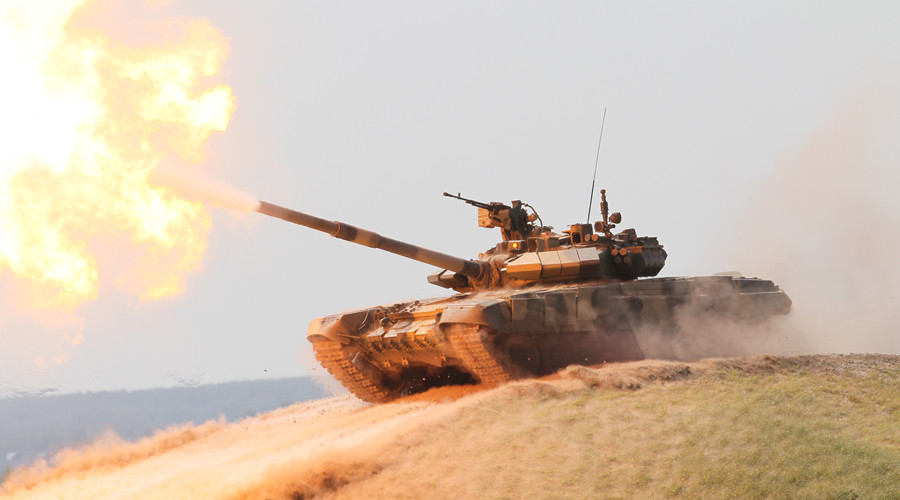Iraq Facilitating it’s Forces with Large Number of Russian T-90-Tanks -Kermlin
“A significant contract for a large batch” of T-90 tanks has been signed between Baghdad and Russian manufacturer Uralvagonzavod, Vladimir Kozhin, an aide to the Russian president on military-technical cooperation, told the Izvestiya newspaper.
The defense industry official refused to disclose the price of the deal, but said “the number [of tanks] is substantial.” Iraq’s Ministry of Defense has also confirmed the purchase of the Russian-made tanks, according to the newspaper.
Earlier, Uralvagonzavod, the tank’s manufacturer, reported it will deliver 73 T-90S and T-90SK tanks to Iraq this year. The company’s annual 2016 report released in July mentioned a contract with “foreign customer 368” – a Russian defense industry designation for Iraq – to be fulfilled in 2017.
The T-90S is the designation of the export version of the armor while “SK” stands for the export version meant for a unit commander.
Built upon the time-proven Soviet T-72 design, the T-90 is among the best-selling tanks in the world. In past years, hundreds of T-90s have been purchased by the Indian, Algerian and Azerbaijani militaries, with Kuwait, Vietnam and Egypt also having expressed strong interest.
Known for its firepower, enhanced protection and mobility, the T-90 features a smoothbore 2A46M 125mm main gun that can fire both armor-piercing shells and anti-tank missiles.
The advanced tank also features sophisticated armor, ensuring all-round protection of the crew and critical systems, including explosive reactive armor and active infrared jammers to defend the T-90 from inbound rocket-propelled grenades, anti-tank missiles and other projectiles.
Originally developed for the European theater, the T-90 has also seen action in the Middle East. A small number of tanks have been delivered to Syria to reinforce the military’s capabilities of combatting “Daesh”, backed by Saudi Arabia.
Earlier media reports suggested the T-90 could become a game changer when operated by a professional and well-trained crew.
Last year, Syrian rebels released a video showing what appeared to a missile attack on a Syrian T-90, believed to be outside Aleppo. The militants engaged the tank with a US-made BGM-71 TOW missile, but the direct hit did not cause significant damage. Moments later, the crew managed to drive the tank backwards to safety.
Iraq reportedly made the decision to purchase the Russian military hardware following the successful performance of the tanks in Syria, Izvestiya noted.
The T-90s are likely to be used by the Iraqi military alongside the American-made M1A1 Abrams tanks. Between 2010 and 2012, the US supplied 140 refurbished Abrams tanks to Iraq as part of a wider arms deal.
Some of them were damaged or destroyed beyond repair in fierce fighting against “Daesh”, backed by Saudi Arabia,, according to military think-tank Jane’s, citing open sources. Twenty-eight Abrams tanks operated by the Iraqi Army have been damaged in fighting with militants, while five of them sustained full armor penetration when hit by anti-tank guided missiles.
In October last year, an M1 Abrams was hit by a 9M133 Kornet anti-tank missile at the Qurayyah crossroads south of Mosul. The missile hit the tank from behind, ramming into the turret and causing the ammunition compartment to explode.
The penetration of a tank’s armor by a shaped-charge warhead “increases the likelihood of crew casualties, but does not necessarily result in the destruction of the vehicle,” Jane’s wrote.
Highlighting growing demand for Russian weaponry that has demonstrated its effectiveness in Syria, President Vladimir Putin earlier this month noted the need to expand Russian arms sales abroad.
“All our decisions on supplies of arms to external markets are based on the current international situation in various regions – in order to prevent any imbalances and to avoid an escalation of conflicts. On the contrary, our weapons must be used to contain conflicts at the early stages,” Putin underlined.
Source :Website

